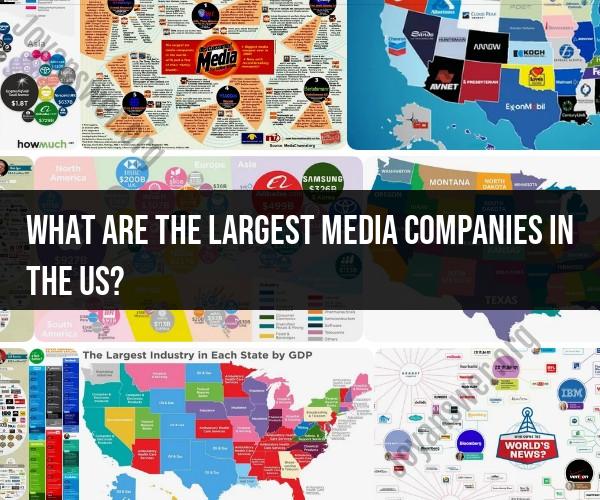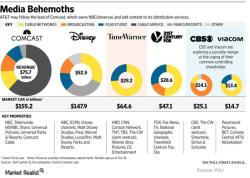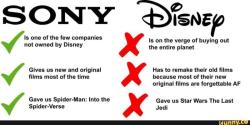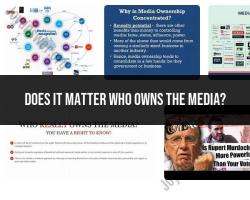What are the largest media companies in the US?
The United States is home to several major media conglomerates that operate across various sectors of the media industry. These companies are involved in television, film, publishing, digital media, and more. here are some of the largest media companies in the United States:
The Walt Disney Company:
- Disney is one of the largest and most well-known media conglomerates. It owns multiple television networks, including ABC, ESPN, and Disney Channel, as well as the film studio Walt Disney Pictures. It also acquired 21st Century Fox, expanding its portfolio.
Comcast Corporation:
- Comcast is a major media and telecommunications company that owns NBCUniversal. NBCUniversal includes the NBC network, Universal Pictures, Universal Parks & Resorts, and various cable networks such as MSNBC, CNBC, and USA Network.
AT&T Inc.:
- AT&T owns WarnerMedia, which encompasses Warner Bros. (film studio), HBO (cable network), and CNN (news network). AT&T also launched the streaming service HBO Max.
ViacomCBS Inc.:
- ViacomCBS owns a portfolio of media properties, including the CBS network, Paramount Pictures, MTV, Nickelodeon, and Showtime. It also operates the streaming service CBS All Access (now known as Paramount+).
News Corporation:
- News Corp is a diversified media and information services company with holdings in news, publishing, and digital media. It owns properties such as The Wall Street Journal, HarperCollins, and the New York Post.
Fox Corporation:
- Following the acquisition of 21st Century Fox by Disney, the remaining assets of 21st Century Fox became Fox Corporation. It includes the Fox Broadcasting Company and Fox News Channel.
Discovery, Inc.:
- Discovery owns a wide range of television networks, including Discovery Channel, Animal Planet, TLC, and HGTV. It also acquired Scripps Networks Interactive, further expanding its content offerings.
Bertelsmann:
- Bertelsmann, a German media conglomerate, owns several U.S. media properties, including Penguin Random House (book publishing) and BMG (music publishing).
Sony Pictures Entertainment:
- Sony Pictures is a division of Sony Corporation and is involved in film and television production. It's known for movies like Spider-Man and franchises like Men in Black.
Cox Enterprises:
- Cox Enterprises is a privately held conglomerate with significant media holdings, including Cox Communications (a cable and internet provider) and Cox Media Group, which operates television and radio stations and newspapers.
Please note that the media industry is dynamic, and mergers, acquisitions, and changes in the industry landscape can occur. Additionally, the rise of streaming services has led to further competition and disruption in the media sector since my last knowledge update. Be sure to check the latest information to stay updated on the ever-evolving media landscape in the United States.
1. Largest media companies in the United States by market capitalization
The largest media companies in the United States by market capitalization as of October 28, 2023 are:
- Walt Disney Company (DIS)
- Comcast Corporation (CMCSA)
- Charter Communications, Inc. (CHTR)
- Alphabet Inc. (GOOGL)
- Meta Platforms, Inc. (META)
2. Major players in the media industry and what they own
The major players in the media industry own a wide range of media assets, including television networks, radio stations, newspapers, magazines, film studios, and digital media companies. Some of the most notable examples include:
- Walt Disney Company: ABC, ESPN, Disney Channel, Pixar, Marvel Entertainment, Lucasfilm, 20th Century Studios, Hulu
- Comcast Corporation: NBCUniversal, CNBC, MSNBC, E!, Bravo, Syfy, Universal Studios
- Charter Communications, Inc.: Spectrum News
- Alphabet Inc.: YouTube, Google News, Waze
- Meta Platforms, Inc.: Facebook, Instagram, WhatsApp
Other major players in the media industry include:
- Warner Bros. Discovery: CNN, TBS, TNT, HBO, Warner Bros. Pictures, Discovery Channel, TLC
- ViacomCBS: CBS, Paramount Pictures, Nickelodeon, MTV, BET
- Sony Group Corporation: Sony Pictures Entertainment, Sony Music Group
- Fox Corporation: Fox News Channel, Fox Sports, Fox Broadcasting Company
3. Impact of media conglomerates on the diversity of media content and perspectives
Media conglomerates have a significant impact on the diversity of media content and perspectives. Critics argue that media conglomerates tend to produce homogenized content that reflects the interests of their shareholders, rather than the interests of the public. This can lead to a lack of diversity in the viewpoints and voices that are represented in the media.
Additionally, media conglomerates may be less likely to produce content that is critical of their own interests or the interests of their shareholders. This can lead to a lack of accountability and transparency in the media.
However, supporters of media conglomerates argue that they can help to produce high-quality content that is affordable and accessible to a wide audience. Additionally, they argue that media conglomerates can provide a platform for diverse voices and perspectives.
4. Trends and changes affecting the landscape of media companies in the US
The landscape of media companies in the US is changing rapidly, due to a number of factors, including:
- The rise of streaming services: Streaming services such as Netflix, Hulu, and Amazon Prime Video are disrupting the traditional television industry. Viewers are increasingly choosing to watch content on streaming services, rather than on traditional cable or satellite TV.
- The growth of social media: Social media platforms such as Facebook, Instagram, and Twitter are playing an increasingly important role in the media landscape. Social media platforms allow users to create and share their own content, and they also provide a platform for news and information.
- The decline of print media: Print media, such as newspapers and magazines, is declining in popularity. This is due to a number of factors, including the rise of digital media and the decline in advertising revenue.
5. Influence of media ownership on the portrayal of different demographic groups
Media ownership can influence the portrayal of different demographic groups in a number of ways. For example, media conglomerates may be less likely to produce content that is targeted at specific demographic groups, such as women or minorities. This can lead to a lack of representation of these groups in the media.
Additionally, media conglomerates may be more likely to produce content that stereotypes or denigrates certain demographic groups. This can have a negative impact on the public's perception of these groups.
It is important to note that not all media conglomerates have a negative impact on the portrayal of different demographic groups. Some media conglomerates are committed to producing diverse content that reflects the interests of all viewers.
Overall, the media landscape in the US is changing rapidly, and the role of media conglomerates is evolving. It is important to be aware of the potential impact of media ownership on the diversity of media content and perspectives.









